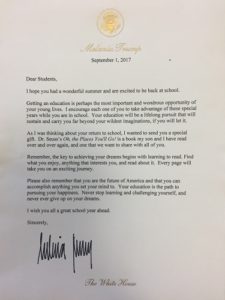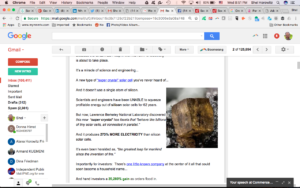Melania, Dr. Seuss, Racism, and Class Issues—What a Kerfluffle
This post was going to be about political correctness overreach and a children’s librarian calling Dr. Seuss racist. That’s the story as a lot of right-wing bloggers and media outlets tell it.
But the real story is about something even bigger: the need to discover the truth. And sometimes that means we have to go to primary sources. Several pieces are in play here, and most of the news coverage is focusing on only one (different sources, different pieces). I thank my journalism training for preventing me from embarrassing myself
Yes, A Librarian Refused the Donation
Melania (the current US First Lady) donated books to one school in every state.

Most of us will agree that’s a good thing. But as Newsweek reports,
Liz Phipps Soeiro, the school librarian for Cambridgeport [Massachusetts] Elementary School, announced in an open letter to [Melania] that she would not be accepting the gift because her school was not in need of the additional books, also telling the first lady that “Dr. Seuss is a bit of a cliché.” Dr. Seuss!
But Soeiro Had a Good Reason to Refuse the Donation
But here’s the part where I agree with Soeiro, and I had to go to the original Horn Book post to find it: Melania selected only one school in each state. Soeiro found the criteria on the White House website:
“working with the Department of Education to identify schools with programs that have achieved high standards of excellence, recognized by State and National awards and Blue Ribbon Awards…”
Soeiro quite appropriately criticized this process, noting that it transfers more resources to those who already have the most, while schools that would be desperate for books and thrilled to get this donation—schools that are educating their kids with a fraction of the resources wealthy Cambridge (home of Harvard University and MIT) can deploy—are left out because they don’t win awards for excellence. In my opinion, this is like so much else in the DT family agenda. The rich get richer and the poor have 30 or 40 kids in a class and low-quality instructional materials.
Soeiro says,
Are those kids any less deserving of books simply because of circumstances beyond their control? Why not go out of your way to gift books to underfunded and underprivileged communities that continue to be marginalized and maligned by policies put in place by Secretary of Education Betsy DeVos? Why not reflect on those “high standards of excellence” beyond only what the numbers suggest? Secretary DeVos would do well to scaffold and lift schools instead of punishing them with closures and slashed budgets.
And she mailed back the books to the White House.
But wouldn’t it have been more effective to mail those books to one of those deserving schools that don’t win awards? Soeiro could have mailed them, just as publicly, to one of the districts she cites as suffering—Philadelphia, Chicago, or Detroit—or to an underserved community right in Massachusetts, like Holyoke, Springfield (whose mayor said publicly they’d be glad to have the books), or Lawrence. She could have been just as public and gotten just as much attention. Melania will just give them to the next rich runner-up.
Yes, Soeiro Claimed Seuss Promoted Racism
That Newsweek article doesn’t quote another part of Soeiro’s letter, published as a blog on the Horn Book children’s lit site (though this article attributed to Newsweek but published on Yahoo does)—but this is the part that has conservatives in a dither:
Another fact that many people are unaware of is that Dr. Seuss’s illustrations are steeped in racist propaganda, caricatures, and harmful stereotypes. [emphasis mine]
OK, let’s talk about the difference between opinion and fact. A fact is something that can be proven (and there’s no such thing as “alternative facts”). A person may have a viewpoint about that fact, and that’s opinion.
Sometimes people discover that their “facts” aren’t actual facts. When my house was built in 1743, the accepted wisdom among colonists of British ancestry was that tomatoes can be lethal, and nobody can go faster than a horse. Anyone stating otherwise would have been called insane.
Of course, these turned out to be opinions. Wrong ones. We know now that tomatoes are not poisonous—and humans can fly around the earth (in the space station) at more than 17,000 miles per hour.
The fact: Seuss’s post-WWII illustrations demonstrate a wide diversity of races and cultures, including many “races” that he made up entirely. Taking his work as a body, humans are only a modest portion of his characters, even his main characters.
Soeiro says his books are based on stereotyping. That’s her opinion and that of the scholars she cites. My opinion is that his books were promoting cultural diversity, acceptance of differences, and a society based in cooperation. I base this on reading many of his works. I’ve read Dr. Seuss books that ridicule…
- Racism (The Sneetches and Other Stories, published way back in 1953)
- Dictatorships (Yertle the Turtle)
- Conformism (Horton Hears a Who)
- War (The Butter Battle Book)
I’ve also read a number of Seuss books that defend underdogs and the environment (The Lorax)—to name just four of his many books espousing a progressive agenda.
And just as Soeiro cites sources that bolster her opinion, I can cite sources that bolster mine. For example, this profile of Seuss in Tikkun highlights many of his progressive activities and works (although it acknowledges that during WWII, his drawings for adults had a distinctly racist cast when it came to the Japanese. I’m not excusing that but the evidence is strong that he grew out of this attitude, especially in his horror over the Hiroshima bombing).
One not-so-nice thing about our world is that things get all out of proportion because the Internet amplifies opinions better than it amplifies facts. But one very good thing is how easy it is to go to the primary sources. Even if Newsweek hadn’t included the link, it was easy to find Soeiro’s original piece in Horn Book (it came up in the same search results page as the Newsweek article, in fact). And it was just as easy to find the Tikkun piece that mostly supported my position.
So…in any controversy, before you jump up and down and wave banners, take a couple of minutes to determine the facts. Look for coverage in reputable mainstream media whose trained and experienced reporters are vetting stories. Use a fact-checking site like Snopes. And do your part to keep the society-wide conversation focused on the truth and not on wild accusations. Often, as in this case, things are much more nuanced than they seem.









